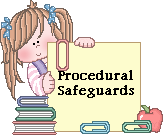Six Major Principles of IDEA: 4. Procedural Safeguards
Procedural Safegurads
When Congress enacted Public Law 94-142 as the Education for All Handicapped Children's Act in 1975, they included a system of procedural safeguards designed to protect the rights of children with disabilities and their parents. During subsequent reauthorizations of the law, now known as the Individuals with Disabilities Education Act, Congress maintained and added to these safeguards.
Procedural safeguards include the right to participate in all meetings, to examine all educational records, and to obtain an independent educational evaluation (IEE) of the child. Parents have the right to written notice when the school proposes to change or refuses to change the identification, evaluation or placement of a child.
The law includes several ways to resolve disputes including mediation, a "Resolution Session" and due process hearings. Procedural safeguards include legally binding written mediation agreements and confidentiality.


Written Notice
Prior written notice refers to messages that you’ll receive from the school system at specific times. At its heart, prior written notice is meant to inform you, as parents, as fully as possible about any actions the school system is proposing to take (or refusing to take) with respect to:
-
your child’s identification as a “child with a disability” as defined by IDEA and State policy;
-
your child’s evaluation;
-
his or her educational placement; and
-
the school system’s provision of FAPE to your child. (13)
Prior written notice includes notifying you of upcoming meetings far enough in advance to ensure that you have the opportunity to attend and scheduling those meetings at a mutually agreed-on time and place.
Parental Consent
Being notified by the school system about meetings and other actions regarding your child’s education is a critical aspect of your right as a parent to be involved in that education—but not the only critical aspect. At certain times and for specific things, you also have the right to give or refuse your parental consent. Let’s take a look at how IDEA defines parental consent and when the school system must ask for (and receive) your consent.
Consent within IDEA means that you, as parents, have been fully informed of all information that’s relevant to the activity for which your consent is being sought and that you agree to the activity in writing. The school system will use prior written notice to inform you fully. Prior written notice, you’ll recall, must include a comprehensive description of the activity the school system is proposing. Only by building a foundation of understanding can your informed consent be given.
Surrogate Parents
Each public agency must ensure that the rights of a child are protected by determining the need for, and assigning, a surrogate parent whenever:
-
No parent can be identified
-
The public agency cannot locate a parent
-
The child is a ward of the state
-
The child is an uncompanied homeless youth
If a child is a ward of the state, then a surrogate parent may be appointed byt he judge who oversees the child's care.
Access to Educational Records
Parents have the rights to see, make copies of, and get an explanation of their child's educational records.
Due Process Hearing
A due process hearing takes place after the parent has filed a due process request and the school has held a resolution session. The due process hearing is like a courtroom trial and is the time when the parents and the school will present arguments and evidence to an administrative judge or impartial hearing officer.
Mediation
Mediation is an alternative to a due process hearing. A mediator helps the parents and the school to try and resolve an issue.
Procedural Safeguard Notice
The school must provide parents with a written explanation of all the procedural safeguards that they are entitled to under federal and state law.
Parent Refuses Consent During the Identification Process or For Service Delivery
If the school asks parents to give consent for the first time that special education and related services are provided to the child, and the parents do NOT give their consent, the school may NOT use IDEA's safeguards to obtain their agreement or to obtain an order that serivces may be provided to the child without their consent.
The result of it:
The child will NOT receive special education and related services as part of his/her public education.
Tips on How to Improve a Child's Special Education
1. Use the Findings and Purposes in IDEA 2004 to Establish a Higher Standard for a Free, Appropriate Public Education (FAPE).
2. Use IDEA 2004 and No Child Left Behind (NCLB) to Obtain a Better Individualized Education Program (IEP).
3. Include Research Based Methodology in the IEP.
4. Ensure That Annual Goals are Comprehensive, Specific and Measurable.
5. Use New Evaluation Procedures to Monitor Academic Progress and Progress on IEP Goals.
6. Give Consent Only for Evaluations or Portions of the IEP to Which You Agree.
7. Insist that the Child’s Regular Education Teacher(s) Participate in IEP Meetings.
8. Avoid Three-Year IEPs Like the Plague.
9. Challenge Suspension or Expulsion if Child’s Behavior was a Manifestation of the Disability, or if the Alternate Placement Does Not Provide FAPE.
10. Avoid Due Process Hearings if Possible.
Due process hearings should be your last resort, after you have attempted all other methods to resolve your dispute. Due process hearings are often an expensive and lengthy process. There are few absolutes in the law, and perhaps even fewer absolutes in the context of special education litigation.
The adversarial nature of due process hearings often creates a wound in the relationship between parents and school personnel that never heals.
Try to resolve your dispute through IEP meetings, mediation, and/or the Resolution Session before you request a due process hearing.
